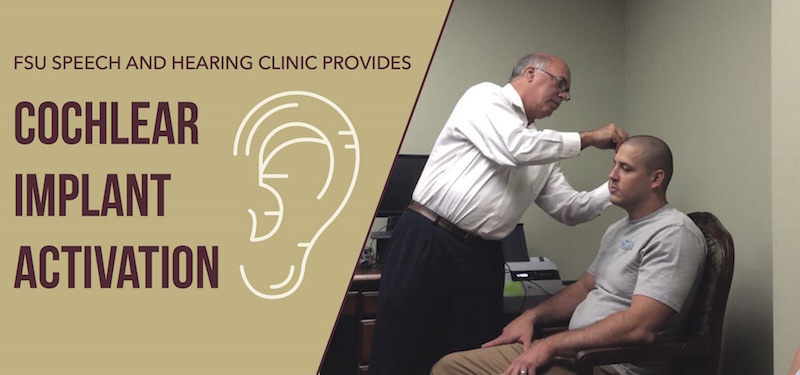28-year-old Eric Allbritton is a father, a husband, a graduate architect and a cochlear implant patient. His parents believe that a bad fever that he experienced as a toddler caused him to have increased hearing loss throughout his life. He doesn’t remember hearing birds as a child, but this wasn’t strange to him because he didn’t realize what he was missing out on. His parents started to think that something wasn’t right when he was unable to say certain words the right way.
Like many other people’s, his specific kind of hearing loss can’t be helped with hearing aids or other non-invasive procedures. In fact, Allbritton says that hearing aids made the sounds around him seem like they were being echoed through a microphone. While Allbritton has acquired fantastic lip-reading skills, he realized after becoming a father that he wanted to be able to hear his children. His daughter’s classmate’s father also has hearing issues, and he recommended the FSU Speech and Hearing Clinic to Allbritton. That’s when he started learning more about the cochlear implant.
“First, I had to convince myself that I wanted to do this,” Allbritton shares. After such little luck with hearing aids, Allbritton was doubtful that this procedure would work.
The cochlear implant is a small electronic device that renews the function of an ineffective inner ear. An internal piece is surgically implanted into the skull behind the ear. An external processor picks up sound waves and turns them into electrical impulses that are transferred via a magnet to the internal hardware through tiny bumps on a plastic piece. These electrical impulses travel from the ear to the brain and allow the patient to hear.
However, the patient doesn’t hear right away. The device can’t be activated until 4-6 weeks after the surgery, and after that it may take several months for the patient to be able to hear and speak normally. In fact, patients hear strange and often unnerving sounds until the brain can adjust to the cochlear implant. Dr. Selena Snowden of the FSU Speech and Hearing Clinic and FSU’s School of Communication Science & Disorders says that some patients compare the sound to something like Donald Duck’s voice. It can be overwhelmingly powerful for a patient, especially one who has been unable to hear for most of their life.
“It was like everything was on top of me,” Allbritton says of the experience. “It was like being in outer space.”
However, Allbritton pushed through and started getting used to the device after only two days.
Snowden says, “He acclimated quicker than I expected. Eric is probably one of the most determined people I’ve ever met.”
Typically, cochlear implant candidates in north Florida must travel several hours to Gainesville or Jacksonville for pre-operation evaluation, the operation itself and months of post-op work. A person interested in receiving a cochlear implant must first go through a hearing aid trial to determine if they are an audiologic candidate. The person goes through a battery of speech and hearing tests with and without hearing aids to prove to the FDA that hearing aids are unable to help. If the person qualifies as an audiologic candidate, he or she must travel again for medical candidacy testing. Doctors determine if the person is healthy enough to receive the treatment through CT scans, MRIs and more. Additionally, the person must have a certain type of hearing loss in order for the implant to work.
This all adds up quickly, and many patients and parents don’t have the time or the money necessary to go through this process. However, thanks to the work done by the FSU Speech and Hearing Clinic and Dr. Snowden, this entire process can take place right here in Tallahassee. While the actual surgery must take place at Shands Hospital or the Hearing and Balance Institute, both in Jacksonville, or elsewhere, everything else can now be done at the FSU Speech and Hearing Clinic right here in Tallahassee.
This is especially significant for the slew of follow-up procedures that must be done. The implant must be reprogrammed weekly for the first few months after the surgery, and other appointments must occur every few months afterwards. This meant that patients living in north Florida and surrounding areas have had to travel frequently for hours on end for several months after the surgery – until now. Today, the treatment is more accessible for the innumerable hearing loss patients who were previously unable to receive it.
Allbritton is the first patient to have a cochlear implant activated in Tallahassee. He received his surgery at the Hearing and Balance Institute in Jacksonville under the care of Dr. Green and has been able to do all of his post-op check-ups at the FSU Speech and Hearing Clinic. His device was activated last summer, and now that it’s April, he is able to hear and speak effectively.
Allbritton appreciated all of the information was presented to him at the FSU Speech and Hearing Clinic and that no one there pushed him to make any certain decision. He says that the knowledge, help and welcoming arms that he received from Dr. Snowden made it seem like she had had this procedure before, even though she’s never experienced hearing loss.
He shares, “She assisted me throughout the whole process.”
It’s been a wild ride for the FSU Speech and Hearing Clinic team, but it’s all been worth it.
Snowden shares, “It was a long process, but now that we’ve done it, we’re trying to get the word out to north Florida.”
In the future, the Clinic wants to expand services for children and adults to make the cochlear implant surgery even more accessible.
If you’d like to read more about Allbritton’s journey, visit his blog here.


